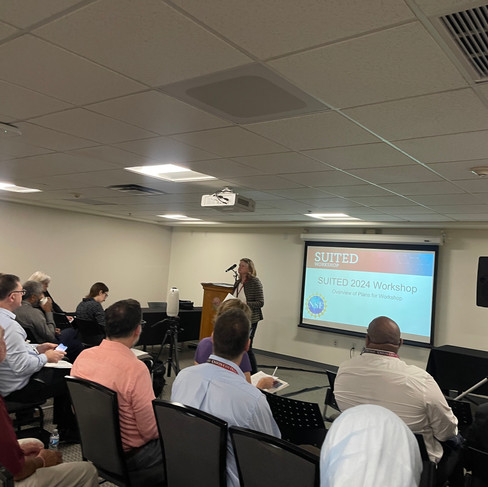SUITED Workshop Introduces Entrepreneurial Strategies & Resources to PUIs
- NYC RIN
- Nov 11, 2024
- 3 min read
Updated: Nov 11, 2024
Nearly 80 academics and administrators from predominantly undergraduate institutions (PUIs) from across the country, including from Washington, California, Indiana, Michigan, Missouri, and New York, gathered at Union College in Schenectady, NY in early November for the third SUITED Workshop—Supporting Undergraduate Institutions in Technology and Entrepreneurship Development. Participants learned how they can pursue an entrepreneurial path to bring their research innovation to market, despite not having access to the support of campus-based innovation and technology transfer resources.

Participating institutions from New York included Borough of Manhattan Community College (CUNY) Colgate University, Hofstra University, Iona University, Queens College (CUNY), St. John’s, SUNY Potsdam, Union College, and York College (CUNY).
“It’s been great to see how engaged all the participating teams are,” said Ann Anderson, Agnes S. MacDonald Professor of Mechanical Engineering, Union College, and SUITED Workshop Organizing Committee Chair. “Their passion for their work and its potential is palpable. And now they have an initial understanding of how they can map a plan to commercialization, and the resources they could use to get there.”
Funded by the National Science Foundation (NSF), SUITED workshop sessions showcased tools to help tackle institutional challenges to participation, build a community that can support these efforts, and share feedback with the NSF on how its policies and programs can better support the needs of undergraduate institutions. The workshop also addressed how to secure support from the NSF’s Technology, Innovation, and Partnership (TIP) activities, which can include technology development, technology transfer, entrepreneurship, commercialization, and innovation. I-Corps was presented as part of the solution to the challenges facing PUIs seeking greater expertise and resources in protecting IP, licensing, market analysis and other aspects of technology transfer.
On the first day of the workshop, 17 faculty and administrator teams representing PUIs from across the country presented their current research and potential market applications, receiving immediate feedback from workshop experts. They then heard from Jessica Fields, a program director at the NSF in the Technology and Innovation Partnerships (TIP) directorate, who provided a thorough overview of the NSF’s I-Corps program along with other relevant federal grants and resources.
During lunch, the participants heard from several speakers. Arber Ruci, Entrepreneur-in-Residence at the NY I-Corps Hub and national I-Corps instructor, provided an overview of the business model canvas and how the teams can immediately begin to use one to map their business plan. A panel discussion about intellectual property followed, featuring Sharokh (Seve) Falati, professor of Law from Practice and director, of the Innovation Center for Law & Technology at New York Law School, Brian Gerling, executive director of the Innovation Law Center and Professor of Practice at Syracuse University, and Christina Brule of Heslin Rothenberg Farley & Mesiti P.C, and a registered patent attorney with the US Patent and Trademark Office, Attendees also heard a talk on storytelling for scientists in an entrepreneurial context, presented by NY I-Corps Hub Storyteller-in-Residence Andrea Retzky.
The lunch discussions were followed by individual team meetings with mentors who provided one-on-one counsel, helmed in part by the CUNY I-Corps team members. Among them, Arber Ruci was at the grants table, explaining how teams could take advantage of TIP resources; Ariella Trotsenko, New York City Innovation Hot Spot Director, addressed questions about accelerators and incubators; including John Blaho, Director, Industrial-Academic Research, CUNY, and Kelly Reardon-Sleicher (SUNY Albany), and Cira Cardaci, Executive Manager of the New York I-Corps Hub helped teams to create their first business model canvas, and Andrea Retzky helped teams to clarify their business thesis and identify analogies to help share their innovation with a broader audience.
That evening, Dr. Megan O’Connor, co-founder and CEO of Nth Cycle, a metal refining company, gave a keynote speech during dinner, sharing her personal journey from academia to entrepreneurship. On the following day, the participants worked on and presented an initial “what’s next” plan for their entrepreneurial ecosystem for the next six months.
Participants finished the workshop with an understanding of the business model canvas, the importance of intellectual property and storytelling, and the federal and state resources available to them. SUITED organizers hope that participants will engage with their regional hubs to continue their pursuit of an entrepreneurial path, hopefully participating in a regional I-Corps within the next six months.








